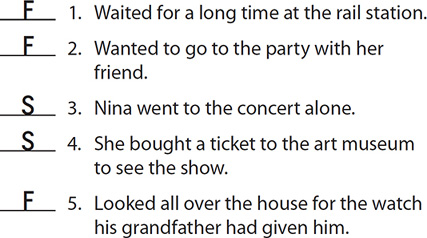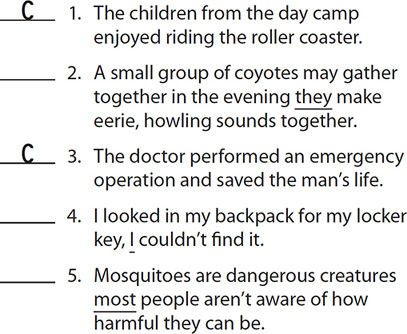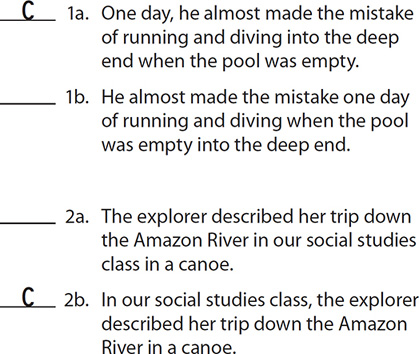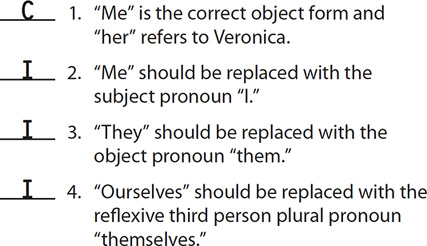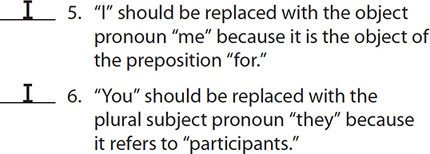ANSWERS AND EXPLANATIONS
Reasoning Through Language Arts (RLA)
Chapter 1 Testing Basic English Usage
Exercise 1: Capitalization
1. The Nurses’ Association is meeting in New York City.
2. The Department of Justice has an office in the Capitol Building.
3. The mayor spoke at the Labor Day parade.
4. The city of Monterey, California, is located on the Pacific Ocean.
Exercise 2: Punctuation
1. They were able to solve the problem without too much trouble.
2. Do we have some time before the show begins?
3. Watch your fingers when you use that knife!
Corrected paragraph: On ice-covered lakes and seas, ships called icebreakers are needed. These ships are used in the Great Lakes, Atlantic Ocean, and Baltic Sea. An icebreaker, which has powerful engines, has sides that are plated with metal. When the icebreaker lifts its front onto the ice, the weight crushes the ice.
Exercise 3: Sentence Fragments
Exercise 4: Run-on and Fused Sentences
Exercise 5: Misplaced and Dangling Modifiers
1. We ate dinner at an elegant restaurant with the Carsons slowly.
We ate dinner slowly at an elegant restaurant with the Carsons.
2. Joanna had a hot dish of cereal this morning before she left for work.
Joanna had a dish of hot cereal this morning before she left for work.
3. After running home, the television was turned on to watch the baseball game.
After running home, we turned on the television to watch the baseball game.
Exercise 6: Parallel Structure
Exercise 7: Improving Awkward Sentences
Exercise 8: Eliminating Informal or Nonstandard Words
1. He is going to the movie tonight.
2. I can see you are upset.
3. I am going home to spend time with my family.
Exercise 9: Subject-Verb Agreement
Exercise 10: Verb Tenses
1. I was in the shower when the phone rang.
2. Since the day when I wrote that poem, I have written two short stories.
3. By the time I remembered that the roast was in the oven, it had overcooked.
4. While he was speaking yesterday, the senator was shouting loudly to make a point.
Exercise 11: Pronoun Usage
Corrected paragraph: Mariana wanted to learn to play the piano, but she knew how difficult learning the piano is for a beginner. Still she worked hard at it and oftentimes gave up her free time. She spent less time at the mall with her friends. In the end, she was pleased with herself.
Exercise 12: Apostrophes and Possessive Nouns
1. In Italian, Florence’s name is Firenze and Venice’s name is Venezia.
2. My sister and I went to several readings that featured T. S. Eliot’s poetry.
3. My father and my brother just started a new business and named it Bailey and Bailey’s Art Supplies.
4. David wrote an irate letter to the newspaper about the editor in chief’s column.
5. I could not find Chris’s new watch in the bureau where he said he put it.
6. The ceremonies’ leaders marched into the room one after the other.
Exercise 13: Transitional Words and Expressions
1. My French teacher speaks Portuguese and Italian; in addition, she can read Spanish.
2. Science was a difficult subject for me in high school; as a result, I avoided science courses in college.
3. Rome has many interesting buildings; for example, the Colosseum is a huge ancient arena.
4. Sam wanted some ice cream; however, the store was out of it.
Exercise 14: Frequently Confused Words
1. This past week has been exceedingly busy.
2. I will get to the additional work when I know it’s time to do it.
3. I wanted to start a new club, but no one was interested.
4. Robert tried two kinds of medicine for his rash.
5. Who’s going to the picnic today?
6. There is no reason to change your outfit before the party.
Practice: Testing Basic English Usage
PASSAGE 1
Select 1 correct answer: past. This adjective is the correct choice. It indicates that something happened a while ago.
Select 2 correct answer: our “Wall of Contributors.” This is the proper way to capitalize a formal name.
Select 3 correct answer: the dinner, dancing, and stand-up comedians. Commas go after every item in a series.
Select 4 correct answer: love to show you around and tell you. These verbs are parallel to one another. Both are in the infinitive form.
PASSAGE 2
Select 1 correct answer: I am a first year student at Cape Fear Community College, majoring in criminal justice. This is the best way to write this sentence in order to eliminate a dangling or misplaced modifier or illogical word order.
Select 2 correct answer: your. This pronoun agrees with its antecedent, you. The other choices do not.
Select 3 correct answer: enjoyed. This is the proper verb form and agrees with the subject I. The verb form is parallel with the verb “worked.”
Select 4 correct answer: public defender’s. This is the proper possessive form for this term.
Select 5 correct answer: I look forward to hearing from you. This is the most formal and professional way to close the letter.
PASSAGE 3
Select 1 correct answer: the weekend of June 21. The focus of the conference is how to improve employee cooperation. This is a run-on sentence and needs to be made into two sentences since it is two complete thoughts.
Select 2 correct answer: Employees will break into small groups to perform key exercises designed to improve cooperation in the workplace. This sentence is the one that is the least awkward and repetitive.
Select 3 correct answer: are. This is the correct verb. Its subject is the plural noun “questions.”
Chapter 2 Testing Reading Comprehension
Practice: Testing Reading Comprehension
1. Correct answer: D. Choice A asks a question about whether a man born behind time would be behind time whenever he was born. This is not evidence for the inference. Choice B states a fact about babies and does not support the inference. Choice C does not support the inference either since it is talking about literature, not man.
2. Correct answer: B. Based on the text, choice A cannot be correct; the author obviously has a good imagination. There is no evidence that choice C is correct. To the author, these questions have great meaning, so choice D is not correct.
3. Correct answer: D. Based on the text, you can apply the reasoning that there is a reason for people being born when they are. Choice A is contrary to what the author suggests. Choices B and C also contradict the author’s beliefs.
4. Correct answer: D. This is the only sentence that gives evidence that the inference about the scientists is accurate. Choice A discusses what the scientists saw when they first saw the man on the beach. Choice B tells about what the scientists did, and choice C tells how the scientists saw the man begging for food from a sailor.
5. Correct answer: B. This is what the passage is mostly about. Choice A is about the scientists who did study the man’s behavior, but this is a detail, not the main idea. Choices C and D are also details, not the main idea.
6. Correct answer: D. There is no evidence in the text that the man enjoyed stealing, and there is no mention of wildlife on the shore, so choice B is incorrect. Choice C is contrary to what is stated in the text; there was plenty of food.
7. Correct answer: A. The story is about a person who nearly starves and whether he will be permanently scarred. In the end, he recovers. He comes back. There is nothing in this story that would suggest that choice B is correct. If anything, the opposite is true. The scientists are curious, not emotional. Choice C is a possible answer, but this is not what the story is about. Choice D is a broad statement that may be true of some scientists, but certainly not true of all scientists.
8. Correct answer: A. This text clearly shows that Lincoln loved to read and learn new things. Choice B may have been true, but this is not what the text suggests about him. The text shows Lincoln as quite serious, so choice C is incorrect. Again, he may have longed for excitement, but there is no evidence of that in the text.
9. Correct answer: C. This is the only sentence that is concerned with slavery. Choice A tells about why Lincoln was hired as postmaster. Choice B tells what Lincoln read as a postmaster. Choice D recounts the fact that Lincoln’s store did not do well financially.
10. Correct answer: D. This paragraph shows that Lincoln knew all types of people and gained information from them. Choice A contradicts what the paragraph is about. It says that his acquaintance would recite Shakespeare and Burns. Choice B is not indicated by the paragraph; Lincoln seems to enjoy the company of this person. Choice C is not indicated either.
11. Correct answer: C. This generalization can be made based on the information in the text. Choice A does not make sense in the context of the text. Choice B is irrelevant; there is no mention of trouble. Choice D is not a generalization that can be made based on the text; it appears that Lincoln was not a good businessman.
12. Correct answer: D. If you analyze the passage, you will figure out that the main idea is that Lincoln loved to learn about things and read a great many books to become educated. Choice D supports this main idea. The other choices are details from the passage, but they do not support the main idea.
Chapter 3 Structure and Author’s Choices
Practice: Structure and Author’s Choices
1. Correct answer: A. This is what the paragraph does. It does not discuss funding (choice B), nor does it focus on the need to promote the use of English. Choice D is incorrect also.
2. Correct answer: C. Context clues help the reader figure out the answer. None of the other answer choices fits within the context of the sentence and paragraph.
3. Correct answer: A. This is the effect of the final sentence. It is strong and direct. It does not lessen the tone; nor does it create a sense of disbelief (choices B and C). It is certainly not ironic.
4. Correct answer: D. The connotations of the word embrace tell you that the speaker wants to welcome people with limited English skills. The literal meaning of embrace is not being used here; rather the word is being used figuratively, so choice A is incorrect.
5. Correct answer: B. This is how the image influences the story. Jonathan’s words indicate that he feels there is no solution to his situation. Choices A, C, and D are not correct because there is no mention of punishment, wrongdoing, or spending time in a jail.
6. Correct answer: C. The overly dramatic references to prison and insects dashing against the wall give a tone of the theatrical to the excerpt. Choice A is incorrect; there is nothing inspiring in Jonathan’s words. Choice B is not correct either because Jonathan is hardly lighthearted on the subject of his job. Although there might be tranquility in lying on the grass, his words do not convey that sense, so choice D is incorrect.
7. The correct order of events:
Linda asks Jonathan if he goes back to work Monday.
Linda suggests that Jonathan will get used to his job.
Jonathan says he will never get used to his work.
Jonathan says he feels like an insect.
8. Correct answer: C. The author subtly suggests through the use of the word that Linda is not all that focused on what Jonathan is saying; she just isn’t that interested. The other choices are not suggested by the text.
9. Correct answer: D. This phrase introduces new information in the text.
10. Correct answer: A. Context can help the reader realize the word means basic. Choice B is an antonym of essential. Choices C and D do not fit into the context of the paragraph.
11. Correct answer: A. If the reader concentrates on the images that the author creates, it becomes clear that he is comparing winter to the return to water and bread from the wine and a banquet of summer.
12. Correct answer: D. The author has a great sensitivity and awareness of the seasons and learns from each one. The other choices are incorrect.
Chapter 4 Literary Texts
Practice: Literary Texts
1. Correct answer: D. The story is about how Tom annoys his aunt, but then when she gets angry, he makes her laugh. Choice D is the only sentence that relates to this theme.
2. Correct answer: B. You can eliminate the other choices by reading the text closely. There is no sign he dislikes his aunt, so choice A is incorrect. There is no evidence that he wants to behave, either, making choice C incorrect. Certainly choice D is incorrect.
3. Correct answer: D. This is the only sentence that supports the idea that Tom is physically speedy. The other sentences describe other aspects of Tom’s character.
4. Correct answer: B. This fact is found in the text itself. The other choices are not correct and there is no evidence to support them.
5. Correct answer: C. Choice B does not seem likely. While he might be fearful of asking how to ride, that is not his predicament. Choice D is incorrect also.
6. Correct answer: D. This is how Travers gets the respect of the other riders. Choice A is not correct; Travers was not responsible for getting Monster to do jumps. Choices B and C are incorrect also.
7. Correct answer: C. The passage says he tried to get Monster to the bridge, but the horse would not comply. The other choices are not indicated.
8. Correct answer: A. Although we cannot be sure what young Paddock’s motivation was, this is the closest to the truth. Clearly Monster was not the best horse, so choice D is not correct. It is doubtful that he was trying to please Travers with what he had to say about the horse. Choice B is not likely, either.
9. Correct answer: B. This is how the setting influences the story. Without the train, Easton would most likely not have run into Miss Fairchild. The other choices are incorrect.
10. Correct answer: D. Putting the hints together, the reader can figure out that this is the relationship between the two men. There is no evidence that choice A is true; nor is there any evidence that choices B or C are true either.
11. Correct answer: B. When Miss Fairchild first sees Easton with handcuffs, she does not know what to think. The text tells you this. The other choices are not correct.
12. Correct answer: B. From the start when Miss Fairchild begins to talk to Easton, the marshal tries to keep her from learning about the truth. This is his viewpoint toward his charge. There is no evidence in the text to support choice A, B, or C.
Chapter 5 Informational Texts
Practice: Informational Texts
1. Correct answer: B. A close reading of the text will show that Audubon is in awe of the power of the storm. He may be somewhat fearful, but he is not terrified by it, so choice A is incorrect. There is no mention of the storm killing people. There is no evidence in the passage for choice D.
2. Correct answer: D. It expresses an opinion of Audubon: he thinks that the whirling forest debris looks like “a cloud of feathers.”
3. Correct answer: A. The storm has a strong effect on the trees, ripping them apart and knocking them over.
4. Correct answer: A. This is a primary source since it was written by a person who experienced the storm. The other choices are no guarantees of reliability.
5. Correct answer: A. Chief Joseph says that he no longer wants to do battle. Choice B is not correct because Chief Joseph has just finished waging a war. Choice C is incorrect because Chief Joseph says that he is now ready to stop fighting. Choice D is incorrect because Chief Joseph makes no attempt to urge other members of his tribe to continue the war.
6. Correct answer: A. Chief Seattle says that Native Americans had little power and were few in number compared to whites. The other choices are directly contradicted by the passage.
7. Correct answer: D. Chief Joseph is announcing his surrender after being beaten in war. Chief Seattle is agreeing to go willingly with his people into a reservation.
8. Correct answer: A. While Chief Joseph and Chief Seattle have different purposes, they share the same concern. Chief Seattle thanks the federal government, but Chief Joseph does not, so choice B is incorrect. Chief Joseph may well be angry about what has happened to his people, but Chief Seattle is not, so choice C is incorrect. Neither chief makes a claim for more land, so choice D is not correct.
9. Correct answer: A. Henry claims that the American colonies are already in a state of war with Great Britain. There is no evidence in the text for the other choices.
10. Correct answer: D. Henry asks several questions. The questions are parallel in form. The fact that he asks question after question is a form of repetition. The other choices are not correct. Henry does not use anecdotes or alliteration.
11. Correct answer: C. This quotation directly supports Henry’s claim that the colonies are not weak. The other quotations are about other subjects.
12. Correct answer: D. The purpose of a timeline is to show the order of events. It allows you to place Henry’s speech within the sequence of events leading to the outbreak of war between the American colonies and Great Britain.
Chapter 6 RLA Extended Response
Practice: RLA Extended Response
SAMPLE EXTENDED RESPONSE
The issue of whether or not women should be allowed to serve in combat positions in the military has been controversial for a long time. It is time for that controversy to end. Women should have the right to be given equal opportunity to serve in combat positions.
Secretary Panetta says, “I’m not talking about reducing the qualifications for the job—if they can meet the qualifications for the job, then they should have the right to serve, regardless of creed or color or gender or sexual orientation.” That is a key piece of his argument for many reasons, and it also knocks a hole in Sentry’s argument. She talks about “watering down” standards for holding combat positions. That is clearly not something that Secretary Panetta intends. Also, Secretary Panetta mentions creed, color, and sexual orientation. He does not go into detail, but I believe he is reminding us that the U.S. Armed Forces used to discriminate against African Americans and homosexuals. These prejudices were also strongly held. Discrimination against women is no different, and no less wrong.
Sentry also argues that even if women could meet the physical qualifications necessary for combat positions, just the presence of a woman in combat would change the way her fellow soldiers fight, meaning that they would want to protect her, and would risk their lives for her because it is their nature to do so. I believe that male soldiers already protect each other and risk their lives for each other. Whether that fellow soldier is a male or female would make no difference. It is true perhaps that our current culture encourages men to protect women, but cultures evolve, and soldiers going into combat receive rigorous training.
It is not that Sentry’s argument isn’t persuasive. Her direct experience in combat makes her statements especially forceful. However, she is just one person. Secretary Panetta has heard directly from multiple veterans and listened to the opinions of top military and civilian leaders. He has based his opinion and decision on a much larger body of information than Sentry has.
It might not happen overnight, but U.S. military culture can and should evolve. All Americans deserve equal opportunity—including the brave female service members who serve our country.
